Whenever the schedule for the Wisconsin Film Festival surfaces, as excited as I am for the newer, smaller indie films that Jim discusses here, I am equally if not more excited for work by the auteurs of both yesteryear and the present. The chance to discover a past master’s work for the first time on the big screen, the opportunity to see the next step in the evolution of modern masters—these are some of the main reasons I attend the festival. Luckily, the Wisconsin Film Festival has always lined up excellent offerings, and this year is no different. Without further ado, here are some initial reactions and brief thoughts on some of this year’s contemporary selections:
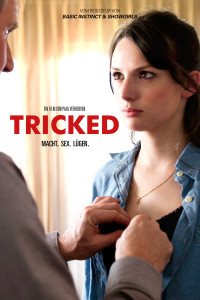 Tricked (Paul Verhoeven)»
Tricked (Paul Verhoeven)»
Verhoeven is a filmmaker of high highs (Robocop, Basic Instinct, The Black Book) and low lows (Business Is Business, Turkish Delight, Hollow Man), but no one save David Cronenberg mixes sexuality, violence, psychological horror, and satire better than Verhoeven. However, the prolific Verhoeven of the 1980s and 1990s has disappeared. Since 2005 his output is, quite incredibly, less than that of even Terrence Malick. His last feature was released almost a decade ago, and with Tricked, he looks to be returning to form, albeit through a fascinatingly collaborative screenwriting process (the finished product was born out of crowdsourcing the plot). When I saw the trailer for this film, the last shot (which I won’t give away here) was one of the most shocking I have seen in years. And, with Verhoeven, you know that shot is merely a taste of what’s to come. Unfortunately, the bulk of his better work is unavailable in streaming format, but if you check with the Madison Public Library system, you can catch up on several of his films. If you want to take a look at his so-bad-it’s-good Flesh + Blood or the sci-fi satire Starship Troopers, they are streaming on Netflix and Amazon respectively.
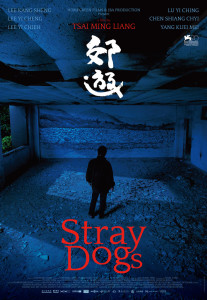 Stray Dogs (Tsai Ming-liang)»
Stray Dogs (Tsai Ming-liang)»
I have fond memories of seeing my first Tsai Ming-liang film, Goodbye, Dragon Inn, at the 2004 Wisconsin Film Festival. My thoroughfare into Taiwanese cinema was Hou Hsiao-hsien, and similar to Hou, I was struck by Tsai’s austerity and his unhurried pacing (sometimes beautiful, sometimes admittedly frustrating). With Stray Dogs, it seems as though he will be pushing the boundaries in both of these areas. David Rooney wrote in The Hollywood Reporter that “the concentration on elliptical observation, mood, and texture signals an almost complete rejection of narrative.” For those who enjoy hypnotically shot and grippingly staged dramas where the story unfolds through subtle visuals rather than dialogue, this would be a film worth checking out.
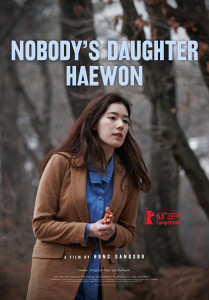 Nobody’s Daughter Haewon (Hong Sang-soo)»
Nobody’s Daughter Haewon (Hong Sang-soo)»
I confess that Hong Sang-soo is a blind spot for me. From what I understand, though, this Korean filmmaker, like Tsai, is apt to use long takes in his work. Unlike Tsai, however, Hong’s films are more seemingly more apt to have long talks as well, or at least have some talking. Reading Richard Brody’s review in The New Yorker, where he refers to some of the characters’ behaviors as being portrayed with “mercurial intricacy,” I am definitely intrigued by this film. The emotional complexity, the realities of the real world vs. what may be found in dreams or remembrances, and the long take style will hopefully mix in compelling fashion. To prime myself appropriately for his film, I will soon be checking out Hong’s In Another Country, streaming through Netflix.
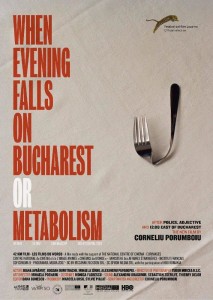 When Evening Falls on Bucharest or Metabolism (Corneliu Porumboiu)»
When Evening Falls on Bucharest or Metabolism (Corneliu Porumboiu)»
I missed my opportunity to see Police, Adjective when it played our festival a few years ago, but I heard nothing but good things. Richard Brody describes this interestingly titled follow-up thusly in The New Yorker: “After making two features that extract political subtleties from memory and language, the Romanian director Corneliu Porumboiu now looks within to extract them from the cinema itself.” And like the previous directors mentioned here, Brody suggests we are in for more long-take cinema, albeit with a more comedic slant. While I tend to view films about film with some skepticism, I am looking forward to this one. If, like me, you are interested in looking at his last two features, you can find 12:08 East of Bucharest and Police, Adjective on Amazon Instant Video.
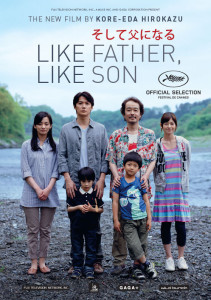 Like Father, Like Son (Hirokazu Kore-eda)»
Like Father, Like Son (Hirokazu Kore-eda)»
Between the ingeniously moving After Life and the devastating Nobody Knows, Kore-eda became for me the calmer alternative to the many yakuza pictures from Takeshi Kitano and Takashi Miike that I was watching at the time (not that I needed an alternative, but still). His work delves more deeply and subtly than most into our choices and the consequences of those choices, and this latest film seems to follow in that tradition. Expect the camerawork to be beautiful, the performances to be touching, and any sentimentality to be both earnest and earned. To get an idea of Kore-eda’s work to date, I would direct you to the two films I mentioned earlier, After Life being available from Madison Public Library and Nobody Knows via Amazon Instant Video.
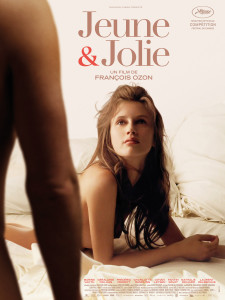 Young and Beautiful (François Ozon)»
Young and Beautiful (François Ozon)»
I first discovered Ozon when I saw his light and colorful murder mystery musical 8 Women. In that film, as in his career, he winds his way through the comedic and the dramatic with equal aplomb. Most of his films feature very powerful leading women (including more frequent collaborators Catherine Deneuve and Charlotte Rampling), and sexuality is often at the fore. Young and Beautiful at first glance appears to be far more on the dramatic side of Ozon’s work, relating the story of a young woman coming of age. A tagline that I’ve seen adds an interesting flourish to this story: “in 4 seasons and 4 songs.” The “4 seasons” portion obviously lends several possibilities from a cinematic standpoint, but my curiosity is piqued by the “4 songs” portion. For an Ozon primer, check Netflix Streaming for his thriller Swimming Pool and Amazon Instant for the lighter Potiche.
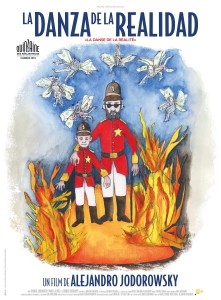 The Dance of Reality (Alejandro Jodorowsky)»
The Dance of Reality (Alejandro Jodorowsky)»
Once again, the festival has provided opportunities in the past to see Jodorowsky’s work with the amazing El Topo and The Holy Mountain. Say whatever you like about Jodorowsky’s oeuvre, but it is completely unlike anyone else’s. Like Verhoeven, he has not made a film in some time—more than two decades, in fact. So when one of the most esoteric directors of the past several decades comes back to filmmaking, it is truly an event that we as audience members are fortunate to be part of. Jodorowsky examines his own past in this film, and while I can’t imagine how it could be as shocking as some of his previous work, I can imagine that it certainly could be as surreal. If you want a taste of what you might have in store, you can take a look at his last feature, Santa Sangre, on Amazon Instant.
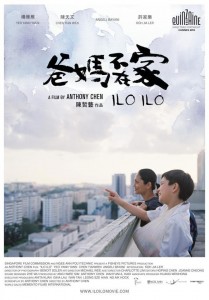 Ilo Ilo (Anthony Chen)»
Ilo Ilo (Anthony Chen)»
Anthony Chen is my other blind spot, but for the most obvious reason: this is his first feature film. Since Ilo Ilo won the Camera d’Or (Best First Film prize) at the Cannes Film Festival, though, I’m eager to check it out and find out whether Mr. Chen is one of the next big auteurs. My fellow collaborator and partner in crime, Jim Kreul, will be posting a full review of the film this weekend, the first of many we here at Madison Film Forum will be providing over the coming weeks.
Now that we’ve looked at some of the more recent auteurs, let’s take a look at some of the revivals that we can enjoy at this year’s festival:
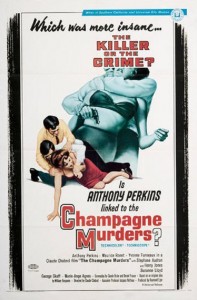 The Champagne Murders (Claude Chabrol)»
The Champagne Murders (Claude Chabrol)»
“Which was more insane? The killer or the crime?” Sometimes, all it takes is a tagline like this to get me to buy a ticket. One of the French New Wave directors, Chabrol may not have been as popular as Godard or Truffaut, but he has produced a similarly extensive a body of work as those filmmakers. This particular entry is a psychological thriller in the Hitchcockian tradition and, in another Hitchcock connection, stars Anthony Perkins (Psycho). Because it is something of a stylistic anomaly in Chabrol’s catalog—his sole film shot Technicolor as well as in anamorphic widescreen—I’m very much looking forward to catching this on opening night. For early Chabrol, look to Les Bonnes Femmes and, also in the psychological thriller category, A Double Tour, both streaming on Amazon Instant. (The former is free if you have Amazon Prime.)
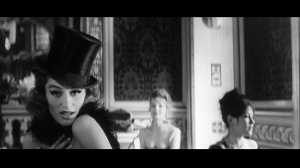 Four by Jacques Demy (Lola, A Room in Town, Three Seats for the 26th, The Umbrellas of Cherbourg)
Four by Jacques Demy (Lola, A Room in Town, Three Seats for the 26th, The Umbrellas of Cherbourg)
When the wonderful Lola hit this year’s festival calendar, I was very pleasantly surprised, for it marks a rare repeat performance of a movie in two different Wisconsin Film Festivals. This one screened at the 2002 WFF, which was the first one I ever attended. At the time, since I was more familiar and enamored with Demy’s poetic, bursting color in films like The Umbrellas of Cherbourg (also screening this year), Lola’s utterly sumptuous black and white cinematography left an unforgettable impression. To see it return to our festival screens in a newly restored transfer is a huge thrill for me on a personal level, as is the restored Cherbourg. Put it this way: if you love musicals and haven’t seen The Umbrellas of Cherbourg, then you truly are missing one of the all-time greats. Rarely a year goes by when I don’t at least listen to Michel Legrand’s brilliant music, and unlike other musicals, every piece of dialogue here is sung. Having never seen the other two festival selections, A Room in Town and Three Seats for the 26th, I’m looking forward to these quite a bit as well. These four films are also the opening salvo in a Jacques Demy retrospective at the UW Cinematheque that starts immediately after the festival ends.
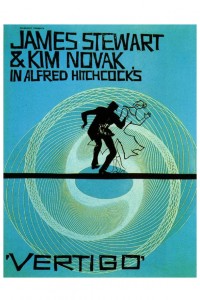 Vertigo (Alfred Hitchcock)»
Vertigo (Alfred Hitchcock)»
Sight and Sound recently voted it the greatest film ever made. While there may be other Hitchcock films that are more enjoyable on an emotional level—Rear Window and North by Northwest immediately spring to mind—I find it difficult to debate Sight and Sound‘s claim from a stylistic viewpoint, at least within Hitchcock’s own body of work. A masterpiece of obsession, it is certainly Kim Novak’s finest hour and one of James Stewart’s finest (who gives an atypically creepy performance here). I saw a print of this film in Chicago last year, and it reminded me of the statement, “If you haven’t seen it on the big screen, you haven’t seen it at all.” With Vertigo, I can’t help but feel that’s true. My only problem with that screening was that the restored stereo sound mix did not really work in the theater. But local filmgoers are in for a treat; this print of the film will come with the original mono sound mix. Not only will we see it as it was meant to be seen but also hear it the way it was meant to be heard. Besides, how could you pass up a big screen viewing of the greatest movie of all time? In addition to the other Hitchcock rarities screening at the festival, be sure to partake of UW Cinematheque’s terrific Hitchcock retrospective and our own tributes to the master of suspense.
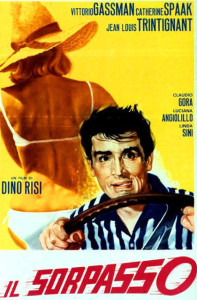 Il Sorpasso (Dino Risi)»
Il Sorpasso (Dino Risi)»
Al Pacino may never have won an Oscar if not for Dino Risi, for it was Risi’s 1974 film Profundo di Donna that formed the basis for Scent of a Woman. Risi has had a substantial career, with dozens of films spanning both time and genre. Il Sorpasso features another favorite actor of mine, Jean-Louis Trintignant (A Man and a Woman, The Great Silence, The Conformist ), in a role that sounds not too dissimilar to the younger protagonist in the two versions of Scent of a Woman: a young, shy student who is taken under wing by an older more vivacious man. An education in the finer things in life, a road trip, a younger man teaching an older man every bit as much as the older teaches the younger—these are all tropes one finds in Scent of a Woman, and tropes in which I delight when part of a story well told. Aside from the opportunity to rediscover this film, added excitement comes from the fact that Alexander Payne (Sideways, The Descendants, Nebraska) will be here in person to introduce the film and talk about what it and Risi’s other work means to him.
Of the films I’ve listed here, I am looking forward to all of them, but I am especially excited to see Tricked, Like Father, Like Son, Lola, and The Dance of Reality. Which are you excited for? Be sure to tell us in the comments section or in our discussion forums.
In the meantime, keep an eye on our website over the coming weeks for more detailed reviews and discussions of many of the Wisconsin Film Festival’s offerings, and beyond for any and all Madison film happenings.
I think Flesh + Blood is so good it’s good. But that’s just me.
Thanks for the comment, Ben. I’d be curious to hear more about your thoughts on the film, as I’ll be revisiting it in the near future.
I do have to say that the line delivery by Jennifer Jason Leigh about the dog falling in the well was, for me, one of the most unintentionally hilarious lines I’ve ever heard,
Well I discovered Flesh + Blood shortly after seeing The Hitcher, and for a time there was nothing Jennifer Jason Leigh and Rutger Hauer could do that I didn’t think was brilliant. Same goes for Verhoeven. I had a VHS copy of Flesh + Blood that my friends and I wore out with repeated after school screenings. The humor, the violence, the nudity. That movie had it all for me. I admit I haven’t revisited it in about 20 years, but I’d be surprised if there were any line readings, especially Jennifer Jason’s, that weren’t hilarious by intent.